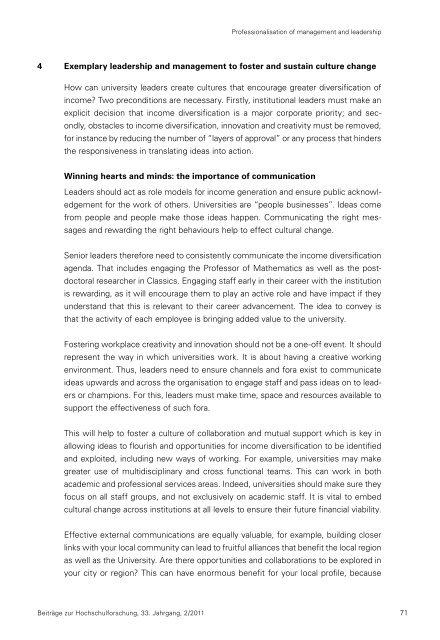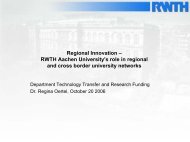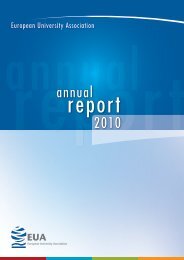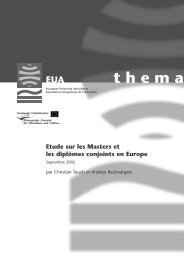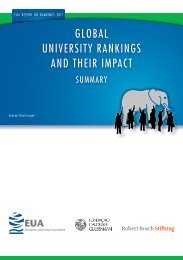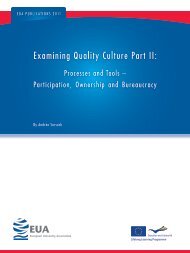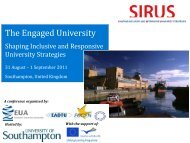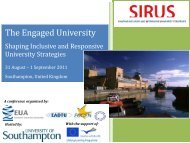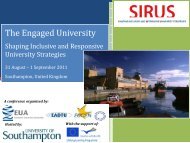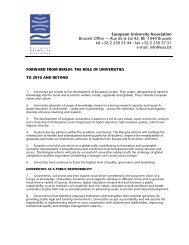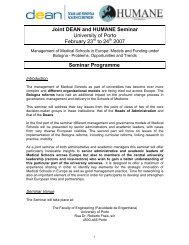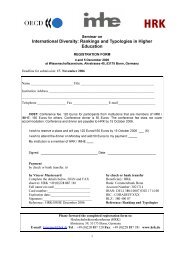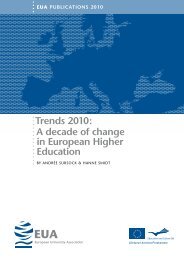Beiträge zur Hochschulforschung - European University Association
Beiträge zur Hochschulforschung - European University Association
Beiträge zur Hochschulforschung - European University Association
Create successful ePaper yourself
Turn your PDF publications into a flip-book with our unique Google optimized e-Paper software.
Professionalisation of management and leadership<br />
4 Exemplary leadership and management to foster and sustain culture change<br />
How can university leaders create cultures that encourage greater diversification of<br />
income? Two preconditions are necessary. Firstly, institutional leaders must make an<br />
explicit decision that income diversification is a major corporate priority; and sec-<br />
ondly, obstacles to income diversification, innovation and creativity must be removed,<br />
for instance by reducing the number of “layers of approval” or any process that hinders<br />
the responsiveness in translating ideas into action.<br />
Winning hearts and minds: the importance of communication<br />
Leaders should act as role models for income generation and ensure public acknowl-<br />
edgement for the work of others. Universities are “people businesses”. Ideas come<br />
from people and people make those ideas happen. Communicating the right mes-<br />
sages and rewarding the right behaviours help to effect cultural change.<br />
Senior leaders therefore need to consistently communicate the income diversification<br />
agenda. That includes engaging the Professor of Mathematics as well as the post-<br />
doctoral researcher in Classics. Engaging staff early in their career with the institution<br />
is rewarding, as it will encourage them to play an active role and have impact if they<br />
understand that this is relevant to their career advancement. The idea to convey is<br />
that the activity of each employee is bringing added value to the university.<br />
Fostering workplace creativity and innovation should not be a one-off event. It should<br />
represent the way in which universities work. It is about having a creative working<br />
environment. Thus, leaders need to ensure channels and fora exist to communicate<br />
ideas upwards and across the organisation to engage staff and pass ideas on to lead-<br />
ers or champions. For this, leaders must make time, space and resources available to<br />
support the effectiveness of such fora.<br />
This will help to foster a culture of collaboration and mutual support which is key in<br />
allowing ideas to flourish and opportunities for income diversification to be identified<br />
and exploited, including new ways of working. For example, universities may make<br />
greater use of multidisciplinary and cross functional teams. This can work in both<br />
academic and professional services areas. Indeed, universities should make sure they<br />
focus on all staff groups, and not exclusively on academic staff. It is vital to embed<br />
cultural change across institutions at all levels to ensure their future financial viability.<br />
Effective external communications are equally valuable, for example, building closer<br />
links with your local community can lead to fruitful alliances that benefit the local region<br />
as well as the <strong>University</strong>. Are there opportunities and collaborations to be explored in<br />
your city or region? This can have enormous benefit for your local profile, because<br />
<strong>Beiträge</strong> <strong>zur</strong> <strong>Hochschulforschung</strong>, 33. Jahrgang, 2/2011 71


